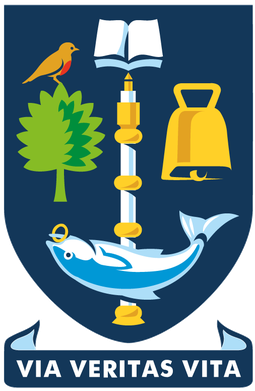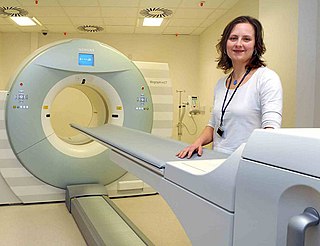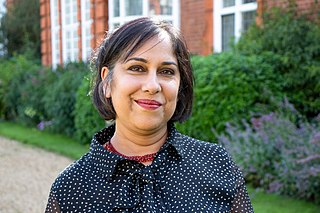
Oxidative phosphorylation or electron transport-linked phosphorylation or terminal oxidation is the metabolic pathway in which cells use enzymes to oxidize nutrients, thereby releasing chemical energy in order to produce adenosine triphosphate (ATP). In eukaryotes, this takes place inside mitochondria. Almost all aerobic organisms carry out oxidative phosphorylation. This pathway is so pervasive because it releases more energy than alternative fermentation processes such as anaerobic glycolysis.

The University of Glasgow is a public research university in Glasgow, Scotland. Founded by papal bull in 1451 [O.S. 1450], it is the fourth-oldest university in the English-speaking world and one of Scotland's four ancient universities. Along with the universities of St Andrews, Aberdeen, and Edinburgh, the university was part of the Scottish Enlightenment during the 18th century. Glasgow is the largest university in Scotland by total enrolment and with over 19,500 postgraduates the second-largest in the United Kingdom by postgraduate enrolment.

The coenzyme Q : cytochrome c – oxidoreductase, sometimes called the cytochrome bc1 complex, and at other times complex III, is the third complex in the electron transport chain, playing a critical role in biochemical generation of ATP. Complex III is a multisubunit transmembrane protein encoded by both the mitochondrial and the nuclear genomes. Complex III is present in the mitochondria of all animals and all aerobic eukaryotes and the inner membranes of most eubacteria. Mutations in Complex III cause exercise intolerance as well as multisystem disorders. The bc1 complex contains 11 subunits, 3 respiratory subunits, 2 core proteins and 6 low-molecular weight proteins.

The Oxford Internet Institute (OII) serves as a hub for interdisciplinary research, combining social and computer science to explore information, communication, and technology. It is an integral part of the University of Oxford's Social Sciences Division in England.
Modernising Medical Careers (MMC) is a programme for postgraduate medical training introduced in the United Kingdom in 2005. The programme replaced the traditional grades of medical career before the level of Consultant. The different stages of the programme contribute towards a "Certificate of Completion of Training" (CCT). It has been dogged by criticism within and outside the medical profession, and an independent review of MMC led by Professor Sir John Tooke criticised many aspects of it.

The General Medical Council (GMC) is a public body that maintains the official register of medical practitioners within the United Kingdom. Its chief responsibility is to "protect, promote and maintain the health and safety of the public" by controlling entry to the register, and suspending or removing members when necessary. It also sets the standards for medical schools in the UK. Membership of the register confers substantial privileges under Part VI of the Medical Act 1983. It is a criminal offence to make a false claim of membership. The GMC is supported by fees paid by its members, and it became a registered charity in 2001.
Peninsula College of Medicine and Dentistry (PCMD) was a Medical and Dental school in England, run in partnership with the University of Exeter, the University of Plymouth and the NHS in Devon and Cornwall. In January 2013 the school began disaggregation to form Plymouth University Peninsula Schools of Medicine and Dentistry and the University of Exeter Medical School.

Photosynthetic reaction centre proteins are main protein components of photosynthetic reaction centres (RCs) of bacteria and plants. They are transmembrane proteins embedded in the chloroplast thylakoid or bacterial cell membrane.

The University of California, Riverside (UCR), School of Medicine is the graduate medical school of the University of California, Riverside, acting as one of six University of California medical schools. It enrolled its first class in 2013, with the first class of 40 medical students receiving their degrees on June 9, 2017.

Joyce Maire Reynolds was a British classicist and academic, specialising in Roman historical epigraphy. She was an honorary fellow of Newnham College, Cambridge. She dedicated her life to the study and teaching of Classics and was first woman to be awarded the Kenyon medal by the British Academy. Among Reynolds' most significant publications were texts from the city of Aphrodisias, including letters between Aphrodisian and Roman authorities.

The Medical Schools Council is an organisation that represents 41 medical schools and one post graduate school in the United Kingdom. The membership is made up of the heads, or deans of the medical schools. It was formerly known as the Council of Heads of Medical Schools.
Fiona Jane Gilbert is a Scottish radiologist and academic.
Audrey Jane Gibson was a British-American microbiologist and biochemist who worked in the field of photosynthetic bacteria. She discovered that selenium is required by the metabolism of coliform bacteria and described a new species of sulphur bacterium in the genus Chloroherpeton. She became a Professor at Cornell University in 1979 and was editor of the scientific journal Applied and Environmental Microbiology.
Marilyn Gunner is a physics professor at the City College of New York (CUNY) and a Fellow of the American Physical Society. She is known for her work on molecular biophysics and structural biology.

Heather Ann Williams is a British medical physicist working as a Consultant Medical Physicist for Nuclear Medicine at The Christie NHS Foundation Trust. She is also a lecturer in the Faculty of Biology, Medicine and Health at University of Manchester, as well as the University of Salford and University of Cumbria.
Diane Kelly is a Professor of Microbiology, Institute of Life Science, Swansea University Medical School and Fellow of the Learned Society of Wales.

Tracy Palmer is a Professor of Microbiology in the Biosciences Institute at Newcastle University in Tyne & Wear, England. She is known for her work on the twin-arginine translocation (Tat) pathway.
Laura Elizabeth Green is a British epidemiologist and academic who is Pro-vice-chancellor and Head of the College of Life and Environmental Sciences at the University of Birmingham. She serves on the council of the Biotechnology and Biological Sciences Research Council (BBSRC).
Azra Catherine Hilary Ghani is a British epidemiologist who is a professor of Infectious Disease Epidemiology at Imperial College London. Her research considers the mathematical modelling of infectious diseases, including malaria, bovine spongiform encephalopathy and coronavirus. She has worked with the World Health Organization on their technical strategy for malaria. She is associate director of the MRC Centre for Global Infectious Disease Analysis.

Manali Desai is a Reader in Sociology and a Fellow at Newnham College. She is currently the Head of the Department of Sociology at the University of Cambridge and is believed the first woman of color to lead a department at the University of Cambridge.











